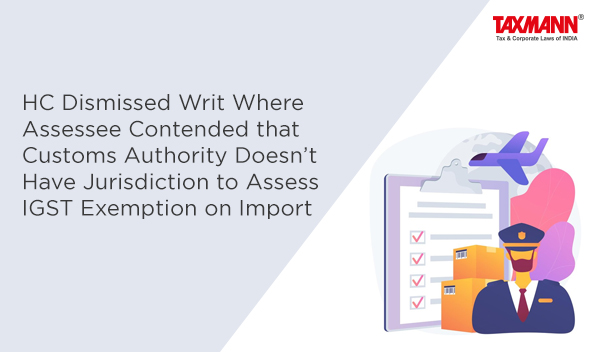HC Dismissed Writ Where Assessee Contended that Customs Authority Doesn’t Have Jurisdiction to Assess IGST Exemption on Import
- Blog|News|GST & Customs|
- 2 Min Read
- By Taxmann
- |
- Last Updated on 21 November, 2023

Case Details: M/S. Ajwa Dry Fruit Impex vs. Union Of India - [2023] 156 taxmann.com 448 (Kerala)[18-10-2023]
Judiciary and Counsel Details
-
- Dinesh Kumar Singh, J.
- K.P. Abdul Azees, T. Archana & Baby Sahla B., Advs. for the Petitioner.
- Ajoy P. B., Adv. for the Respondent.
Facts of the Case
The petitioner imported certain items declaring the same as ‘Wet Dates’, and claimed exemption under IGST. Upon post-clearance audit, it was observed that the exemption is applicable only to fresh dates and the petitioner’s product does not qualify for the same, hence, a Show Cause Notice (SCN) was issued. The petitioner did not file a reply to the SCN and also did not appear for the four different dates granted for the hearing. Thereafter, the petitioner filed reply to the last reminder and the Order stood passed against it.
It filed a Writ petition that the assessing authority under Section 28 of the Customs Act is not empowered to assess the IGST.
High Court Held
High Court noted that Section 2(2) of the Customs Law empowers the assessing authority to determine the dutiability of any goods and the amount of duty/tax, cess, or any sum so payable under the Customs Act or Customs Tariff Act, 1975 (51 of 1975) or under any other law for the time being in force, with reference to exemption or concession of duty, tax, cess or any other sum, consequent upon any notification issued therefor under the said Act or under the Customs Tariff Act or under any other law for the time being in force. Since, the power is given to the Customs authority to pass Orders under other laws as well, it can be said that the authority under Section 28 of the Customs law is empowered to assess the same and the Writ petition stands dismissed.
Disclaimer: The content/information published on the website is only for general information of the user and shall not be construed as legal advice. While the Taxmann has exercised reasonable efforts to ensure the veracity of information/content published, Taxmann shall be under no liability in any manner whatsoever for incorrect information, if any.

Taxmann Publications has a dedicated in-house Research & Editorial Team. This team consists of a team of Chartered Accountants, Company Secretaries, and Lawyers. This team works under the guidance and supervision of editor-in-chief Mr Rakesh Bhargava.
The Research and Editorial Team is responsible for developing reliable and accurate content for the readers. The team follows the six-sigma approach to achieve the benchmark of zero error in its publications and research platforms. The team ensures that the following publication guidelines are thoroughly followed while developing the content:
- The statutory material is obtained only from the authorized and reliable sources
- All the latest developments in the judicial and legislative fields are covered
- Prepare the analytical write-ups on current, controversial, and important issues to help the readers to understand the concept and its implications
- Every content published by Taxmann is complete, accurate and lucid
- All evidence-based statements are supported with proper reference to Section, Circular No., Notification No. or citations
- The golden rules of grammar, style and consistency are thoroughly followed
- Font and size that’s easy to read and remain consistent across all imprint and digital publications are applied



 CA | CS | CMA
CA | CS | CMA
